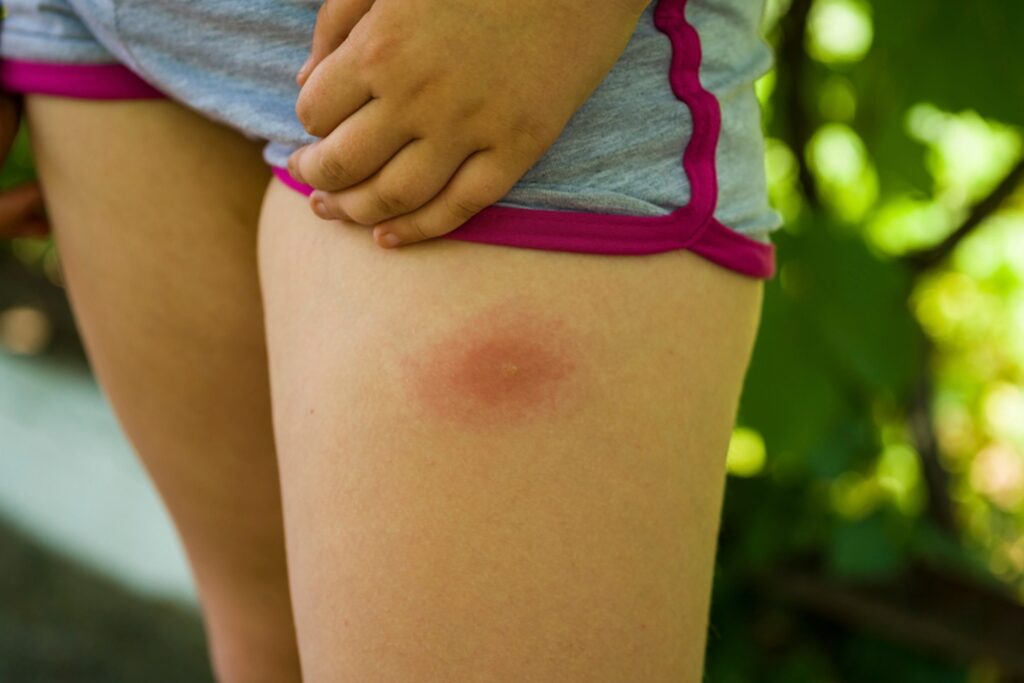It’s getting to be that time of year again when we find ourselves spending more time outdoors to enjoy the sunshine and warmer temperatures.
While a hike in the woods or extra playtime in the backyard may sound harmless, they can come with its dangers, especially when it comes to ticks.
Ticks are tiny, blood-sucking arachnids that can carry Lyme disease or Rocky Mountain spotted fever.
However, it’s essential to know that tick bites are pretty common, especially during the warm months, and the good news is that although quite painful and sometimes unsightly, tick bites are usually harmless.
With that being said, it is still important to be aware of your surrounding and know how to identify if you’ve been bitten by a tick. Some tick bites can be dangerous and require medical attention.
In this blog post, we will discuss when to worry about a tick bite and what you can do to prevent tick bites altogether.
What Does a Tick Bite Look Like?
A tick bite can look different depending on various factors, such as the type of tick, how long the tick was attached to the skin, and the person’s reaction to the bite.
The four most common characteristics are:
- Size: A tick bite is often very small, similar to the size of a pinhead. However, it typically becomes larger as the reaction to the bite progresses.
- Color: The bite site often appears red or inflamed.
- Bull’s eye rash: Sometimes, a tick bite can cause a bull’s eye rash. This is a red ring around the bite area with a clear center. This is a characteristic sign of Lyme disease, transmitted by black-legged ticks.
- Blisters or ulcers: In rare cases, a tick bite can cause blisters or ulcers on the skin.
In rare instances, people may not experience any symptoms after a tick bite.
When to Worry About a Tick Bite
As mentioned, tick bites can be alarming but are often considered harmless.
You should worry about a tick bite if you experience any of the following symptoms:
- Fever
- Fatigue
- Joint pain
- Muscle aches
- A rash
- A bulls-eye rash
- An allergic reaction that could include swelling, itching, hives, difficulty breathing, or anaphylaxis. If you experience a severe allergic reaction, call 9-1-1.
In rare cases, some ticks produce a toxin that can cause paralysis. Symptoms of tick paralysis include weakness, numbness, tingling, and difficulty breathing. If you experience these symptoms after a tick bite, seek emergency treatment immediately.
It is also important to note that if you remove a tick and notice that the mouthparts are still attached to your skin, you should seek medical attention, as they can cause an infection if not removed properly.
How Soon Do You Need Antibiotics After a Tick Bite?
The short answer is that it depends.
According to the CDC, antibiotics should be given as soon as 72 hours after a tick is removed if all of the following criteria are met:
- The tick is identified as a black-legged tick that was attached for at least 36-48 hours
- The patient is not pregnant or allergic to antibiotics
If you do not meet these criteria, your doctor may choose to monitor your symptoms or perform blood tests to detect any signs of infection.
Tips to Prevent Tick Bites
While tick bites are not entirely preventable, especially if you spend a lot of time outdoors, there are various ways to reduce your risk, including
- Wearing protective clothing such as long-sleeved shirts, long pants, and socks to cover your skin when walking in wooded or grassy areas
- Using insect repellent that contains DEET, picaridin, or permethrin and reapplying every couple of hours
- Checking yourself for ticks after spending time outdoors. Pay special attention to areas such as your scalp, behind your ears, and your armpits.
- Removing ticks promptly if you find a tick on your body. Use tweezers to grasp the tick as close to the skin’s surface as possible and pull upward with steady, even pressure. Then, clean the bite area with rubbing alcohol or soap and water.
Stop Worrying About a Tick Bite! Expert Care Is Here Seven Days a Week.
Tick bites are usually harmless, but some can be dangerous.
If you or a loved one develop any symptoms after a tick bite, especially a severe fever, we encourage you to visit our urgent care facility to seek medical attention immediately.
Our experienced and compassionate team at Thibodaux Regional Urgent Care in Houma is available seven days a week with no appointments necessary.
Walk in to get the tick bite care you need now.




